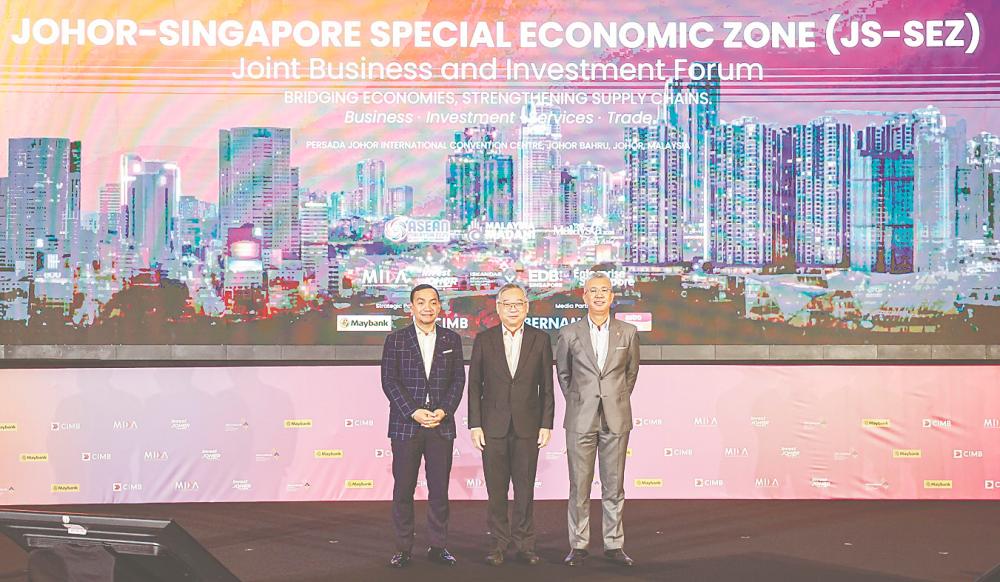JOHOR BAHRU: The Johor-Singapore Special Economic Zone (JS-SEZ) is set to enhance Asean's supply chain efficiency and resilience, said Minister of Investment, Trade and Industry (Miti), Tengku Datuk Seri Zafrul Abdul Aziz.
Additionally, he said the proposed establishment of an Asean/Regional Comprehensive Economic Partnership (RCEP) Industrial Park within the JS-SEZ will contribute towards improving regional economic integration and attracting high-value investments.
He believed that the proposed industrial park aligns with the aspiration to enhance supply chain efficiency and resilience.
“Ultimately, we want the JS-SEZ to be more than just a bilateral framework – it is a value proposition for the whole of Asean,” he said in his keynote address at the JS-SEZ Joint Business and Investment Forum today.
The two-day event, themed “JS-SEZ: Bridging Economies, Strengthening Supply Chains”, is organised by Miti, in collaboration with Singapore’s Ministry of Trade and Industry and the Johor state government.
According to Tengku Zafrul, the federal government supports the proposed regulatory sandbox initiative, to be located at the Ibrahim Technopolis (Ibtec) and Ladang Air Manis in Kulai.
He said the initiative will be instrumental in unlocking new waves of sustainable, high-value investments that benefit both local stakeholders and international partners.
In the meantime, Tengku Zafrul said the heart of the Malaysia-Singapore relationship lies in the fact that the two countries are at their best when working together.
“Malaysia was Singapore’s second-largest trading partner, while Singapore was Malaysia’s largest export destination and second-largest trading partner globally in 2024.
“Our trade in 2024 was a robust US$86.69 billion (RM382.3 billion), driven by electrical and electronics products, petroleum products, machinery, equipment and parts, agricultural, optical and scientific equipment,” he added.
Tengku Zafrul noted that Malaysia is fully committed to securing a favourable resolution that preserves vital market access and supply chains, attracts continued foreign investment, and supports the well-being of its workers and businesses.
He stressed that alongside Asean colleagues, Malaysia will not introduce retaliatory tariffs against the United States (US).
“From Asean’s perspective, retaliation is counterproductive. Rather, the region seeks to engage constructively with the US in a forward-looking manner to strengthen economic ties and address shared challenges,” he said.
Domestically, Tengku Zafrul said, the Malaysian government recognises the challenges the tariffs pose to workers, manufacturers and businesses. “We must and will find a mutually acceptable, fair and equitable solution to this issue, both bilaterally and multilaterally.”
Johor Menteri Besar Datuk Onn Hafiz Ghazi said the Johor state government is mooting the establishment of the Asean industrial park within the JS-SEZ. The industrial park is envisioned to be especially geared towards the RCEP.
“It will aim to attract strategic investments from RCEP member countries by focusing on high-value sectors such as advanced manufacturing, green technology and the digital economy,” he said in his welcoming remarks at the forum.
He said the industrial park will drive technology transfer, boost competitiveness and diversify supply chains across Asean.
“We also hope that it will offer customised incentives such as tax breaks, simplified talent mobility and temporary relaxation of fund repatriation rules to make the industrial park attractive to foreign investors. The aim is to stimulate economic growth and job creation in the JS-SEZ and promote the region as a preferred destination for RCEP-related investment.”
Onn Hafiz said JS-SEZ has spurred Johor investments. New approved investments reached RM27.4 billion in the first quarter of this year compared with RM48.5 billion in 2024.
“(This is) a powerful early signal of the momentum behind JS-SEZ. In fact, for April 2025, there is another RM23 billion worth of projects in the pipeline,” he said.
The Johor government has worked tirelessly to create a welcoming environment that is also efficient, transparent and reliable.
“We have streamlined our investment processes via the Invest Malaysia Facilitation Centre-Johor (IMFC-J). With the Johor super lane, we have introduced a fast-track mechanism that significantly reduces bureaucratic delays for priority investments,” Onn Hafiz said.
Since its launch in February this year, the IMFC-J has handled 252 investment enquiries with 42 high-impact projects now under accelerated processing, he said.
“What took 24 months from briefing to operations is achievable in just 13 to 14 months, a time-saving of almost 10 months. This is not just about efficiency. It is a clear signal to investors: Johor is serious, responsive and ready,” he said. – Bernama









